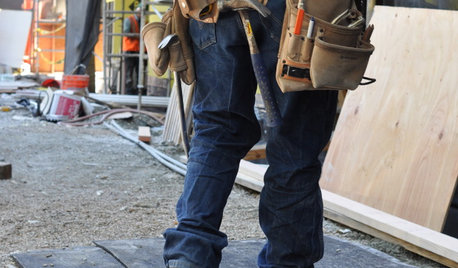how to keep contractors to finish on time
steelskies
9 years ago
Related Stories

CONTRACTOR TIPSContractor Tips: Countertop Installation from Start to Finish
From counter templates to ongoing care, a professional contractor shares what you need to know
Full Story
REMODELING GUIDESContractor Tips: Finish Your Basement the Right Way
Go underground for the great room your home has been missing. Just make sure you consider these elements of finished basement design
Full Story
GARDENING AND LANDSCAPINGContractor Tips: Build a Top-Notch Deck
Get an outdoor deck that fits your lifestyle and stands the test of time by keeping these 4 considerations in mind
Full Story
REMODELING GUIDESContractor's Tips: 10 Things Your Contractor Might Not Tell You
Climbing through your closets and fielding design issues galore, your contractor might stay mum. Here's what you're missing
Full Story
REMODELING GUIDESContractor Tips: What Your Contractor Really Means
Translate your contractor's lingo to get the communication on your home project right
Full Story
REMODELING GUIDESContractor Tips: 10 Hats Your General Contractor Wears
Therapist, financial advisor, mediator — for the price of a single good contractor on your remodel, you're actually getting 10 jobs done
Full Story
CONTRACTOR TIPSContractor Tips: How to Shop for Your Remodel
Small mistakes in buying remodeling materials can add up to huge cost overruns. Here's how to get things right the first time
Full Story
WORKING WITH PROS7 Tips for Making Contractors Your Allies
For a contractor as vested as you are in your home project's success, follow these time-tested techniques from a professional designer
Full Story
LANDSCAPE DESIGNHow to Find and Hire a Great Landscape Contractor
Get your landscape project built on time and on budget by hiring a quality professional
Full Story
BASEMENTSDesign Workshop: Is It Time to Let Basements Become Extinct?
Costly and often unnecessary, basements may become obsolete — if they aren’t already. Here are responses to every reason to keep them around
Full Story









kirkhall
Joseph Corlett, LLC
Related Professionals
Henderson Kitchen & Bathroom Designers · Allouez Kitchen & Bathroom Remodelers · Oklahoma City Kitchen & Bathroom Remodelers · East Hanover Interior Designers & Decorators · New Providence Interior Designers & Decorators · Ashtabula General Contractors · Clinton General Contractors · Columbus General Contractors · Florida City General Contractors · Galveston General Contractors · Groveton General Contractors · Leominster General Contractors · Mira Loma General Contractors · New River General Contractors · Rosemead General ContractorsSaltiDawg
kirkhall
annkh_nd
Cabot & Rowe
steelskiesOriginal Author
kirkhall
renovator8
jackfre
ajc71
Joseph Corlett, LLC
snoonyb